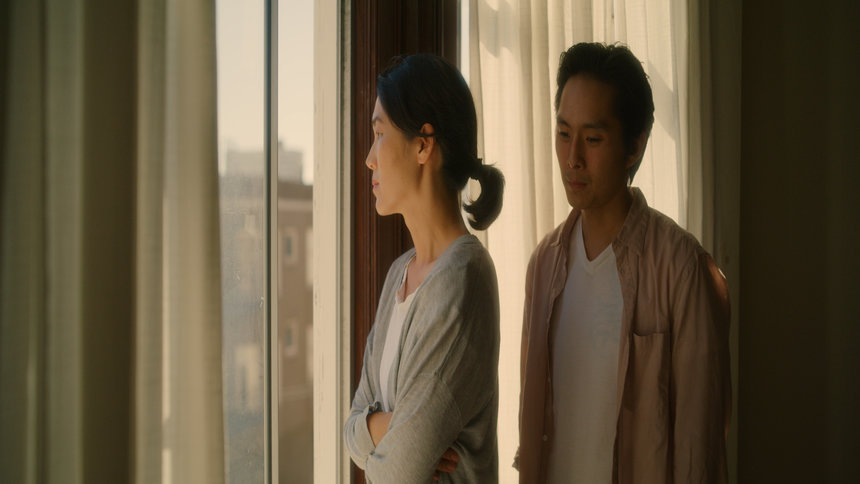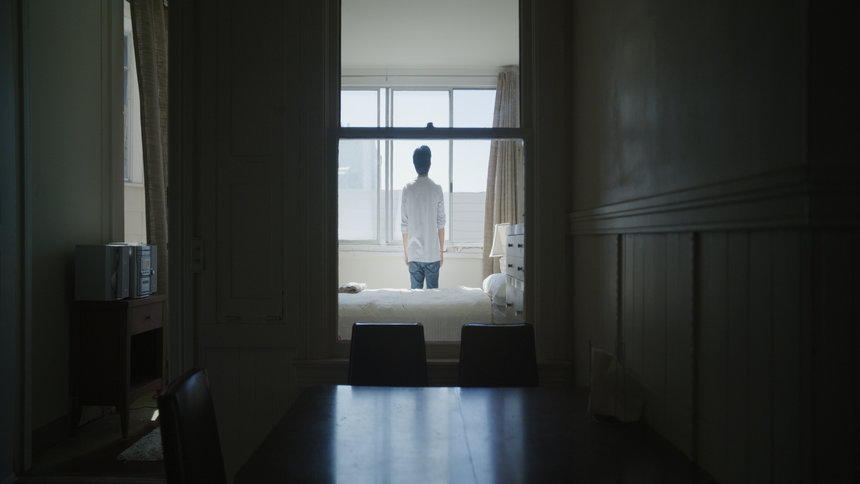Busan 2019 Review: COMING HOME AGAIN, A Personal Chamber Piece on Food and Filial Piety

In Coming Home Again, a Korean American man returns home to take care of his dying mother in this modest and sensitively-rendered chamber piece that takes place in the span of one day on New Year’s Eve. Adapted from a short autobiographical story published in The New Yorker by author Lee Chang-rae, Coming Home Again offers a deeply personal insight into one man’s relationship with mother, using food – in the form of the latter’s cooking – as the central conduit through which the protagonist remembers her and reconciles with her impending death.
Coming Home Again opens with a close-up of a knife scraping a thick, frozen red slab of meat on a chopping board. Chang-rae (Justin Chon) is preparing dakgalbi in the kitchen – his mother’s signature Korean dish – for their family’s annual New Year’s Eve dinner. In voiceover, Chang-rae recounts a line his mother used to say: “The meat needs the bone nearby, to borrow its richness.” It’s one of the few food metaphors that feeds into the film’s intimate exploration of traditional Asian cultural values in an immigrant family, filial piety, and the tenuousness of blood ties.
Down the kitchen lies his ailing mother (Jackie Chung, whose character is unnamed) in bed, attached to an IV drip. Chang-rae’s mother has been diagnosed with terminal stomach cancer, which is described to be “particularly cruel”, because she always cooked so much good food. Now it’s Chang-rae’s turn to cook and care for her, having quit his writing job in New York to return to his family’s San Francisco home to stay by her side; his college professor dad is too busy with work, while his sister is living in South Korea.
Coming Home Again works on the simplicity and specificity of director Wayne Wang’s storytelling – the connection between food and family, and food as the language of love. There’s a clean-cutness to the film’s construction, with its events mostly confined to the clinical, grey setting of Chang-rae’s family home, whether in the kitchen, living room, or by his mother’s bedside. The minimal art direction in turn provides ample room onscreen for the subsequent conversations and expression of emotions to come through.
As Chang-rae prepares his mother’s traditional Korean dishes, the audience is taken through a compilation of flashbacks of his mother’s healthier times, overlaid with voiceovers. Some of these vignettes showcase casual banter over innocuous moments – a conversation about Chang-rae’s dating life, the discovery of a faded high school basketball team photograph – while others are more telling of domestic frictions, such as a dispute over a sappy Korean love song that exposes cracks in the marriage. Each flashback reveals different facets to the woman Chang-rae’s mother was, from her insecurities, to her priorities, to the sacrifices she has made. When pieced together, they paint a larger-than-life picture of a dutiful mother and wife who placed her family’s well-being above her own happiness.
A recurring source of tension between mother and son is the former’s decision to send him away to Exeter for boarding school in his adolescence, and the time they lost together as a result. As much as this is water under the bridge, it’s a topic still brought up by Chang-rae’s mother in present day. She oscillates between conflicting emotions – regret at having sent her son away when he was so young, yet on the other hand, a sense of gratitude for Exeter’s education, which she believes paved the way for Chang-rae’s future successful career. Her sentiments shed light on aspects of the Asian American immigrant experience; in particular, her Asian inferiority complex rears its head later on when she admits to being self-conscious of her English and lack of education.
Both Chon and Chung put in naturalistic performances, with Chung especially magnificent as the selfless maternal figure. Chon wrestles with varying degrees of anguish, grief and self-reproach as his character helplessly watches the slow decline of his mother, who despite being on her deathbed, still insists on taking care of herself to the very end. “My job is to be your son,” Chang-rae says to his mother, though there’s clearly guilt eating away at him, as he yearns to compensate for all the times in the past that he was unkind to her.
The Korean cooking scenes in Coming Home Again are meaningfully choreographed. We watch Chang-rae slice the galbi with fierce precision, gingerly pour the marinade onto every inch of the meat, cut fresh kimchi, stir fry glass noodles in a pan. Yet behind every step that he has taken to prepare this feast lies an underlying desperation – a desperation to replicate the exact recipes which defined his mother and by extension, keep the very essence of her being alive. This culminates in a climatic New Year’s Eve’s dinner among the family, a scene that’s uncomfortable and almost ugly to watch for both the audience and those at the table, but nonetheless manages to hit all the right emotional beats.


Do you feel this content is inappropriate or infringes upon your rights? Click here to report it, or see our DMCA policy.






